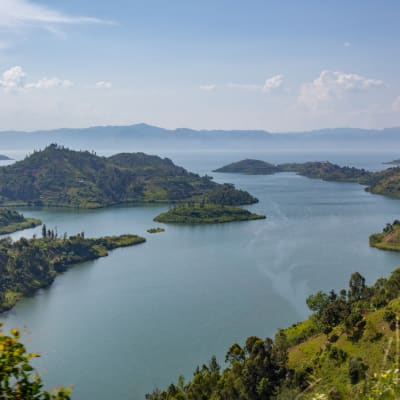
Rwanda Vaccinations
Health and Travel Preparation
Health and Travel Preparation
A journey to Rwanda promises unforgettable experiences — from misty mountain forests and encounters with gorillas to serene lakeshores and the warmth of local hospitality.
To enjoy every moment without worry, it’s important to prepare well for your health and vaccinations before you travel.
This guide covers everything you need to know about vaccinations for Rwanda, including recommended travel vaccines, malaria prevention, and general health precautions.
With the right preparation and timely medical advice, nothing stands in the way of a safe and memorable trip to the heart of Africa.
Recommended Vaccinations for Rwanda
There are no mandatory vaccinations for entry into Rwanda when arriving directly from Europe or North America. In addition to important entry requirements and visa information you should also plan your health precautions early. However, a yellow fever vaccination is required if you are traveling from or transiting through a country where yellow fever occurs — such as Ethiopia, Kenya, or Uganda. Even if you are not required to show proof, the vaccine is often recommended to avoid issues during multi-country trips in East Africa.
In addition, there are several travel vaccinations that are sensible for Rwanda. Which vaccinations are necessary in individual cases depends on the travel time for Rwanda, your route, the duration of the trip, and the type of travel.
Recommended vaccinations for Rwanda at a glance:
| Vaccine | Recommendation | Notes |
|---|---|---|
| Standard vaccinations | Strongly recommended | Ensure boosters for Tetanus, Diphtheria, Polio, Pertussis, Measles, Mumps, and Rubella are up to date |
| Hepatitis A | Recommended | For all travelers, regardless of trip length or type. |
| Hepatitis B | Recommended | For longer stays, close contact with locals, or medical work. |
| Typhoid | Recommended | Especially for rural travel or if you plan to eat street food. |
| Rabies | Recommended | For extended stays, trekking, or potential animal contact. |
| Meningococcal ACWY | Recommended | For longer stays or close contact with local communities. |
| Yellow fever | Required if arriving from endemic areas | Proof of vaccination must be shown on entry; valid for life, effective 10 days after vaccination. |
Particulars of yellow fever vaccination
A yellow fever vaccination is mandatory when entering from yellow fever areas and is required for all travelers aged one year and older. Since yellow fever is endemic in Rwanda and transmitted by mosquitoes, this vaccination provides essential protection. Even for direct entry from Europe, it is advisable to seek advice in advance to comply with current regulations. With a one-time vaccination, travelers receive lifelong protection against this potentially fatal disease.
Tip: Schedule a consultation with a travel medicine specialist or tropical medicine center at least six to eight weeks before departure. This allows time to complete vaccinations and receive advice tailored to your specific route and activities.
Malaria Prevention & Mosquito Protection
Malaria occurs in many parts of Rwanda, though the risk varies by region and altitude.
The eastern lowlands, including areas around Akagera National Park, carry a higher risk than the cooler highlands and Kigali, where cases are rare.
Even so, mosquito protection should always be part of your travel preparation.
Preventive medications
A medication-based malaria prophylaxis is recommended for many travelers, especially for stays in rural areas or during rainy seasons. Which medications are suitable depends on individual factors – such as duration of travel, route, and any pre-existing conditions.
Make sure to get medical advice on this. Alternatively, a stand-by medication may be sensible, which is taken only in emergencies.
Avoiding Mosquito Bites
In addition to medications, a consistent mosquito protection is crucial to minimize the risk of infection:
- Use insect repellents with DEET or Icaridin, especially in the evening hours.
- Wear long, light-colored clothing that covers arms and legs.
- Sleep under a mosquito net, preferably impregnated.
- Use fans or air conditioning in lodges or camps, if possible, as mosquitoes avoid drafts.
Tip: Even though the risk in Kigali or the highlands is lower, malaria can occur throughout Rwanda. Therefore, prevention and protection are always important.
Infectious Diseases & General Health Precautions
Rwanda is considered a safe travel destination with relatively low health risks compared to many tropical countries. Still, travelers should take some basic precautions to avoid common infections and to stay healthy throughout their journey.
Food & Water Hygiene
Traveler’s diarrhea is one of the most frequent travel-related illnesses. To minimize the risk:
- Drink only bottled or boiled water.
- Avoid ice cubes unless made from purified water.
- Wash or peel fruits and vegetables yourself.
- Eat freshly cooked food, especially when dining at local markets.
Packing a small travel health kit with oral rehydration salts, disinfectant, and medication for diarrhea can be very helpful.
Tropical Illnesses
Other tropical diseases such as dengue fever or schistosomiasis (bilharzia) occur only rarely in Rwanda and can easily be prevented:
- Protect yourself from mosquito bites during the day to avoid dengue.
- Avoid swimming in lakes or slow-moving freshwater, especially around Lake Kivu, where bilharzia may occur.
General Health Tips
During your trip, pay attention to adequate sun protection, regular handwashing and good fluid intake – especially during activities in higher altitudes or in warm climates. For pre-existing conditions or longer stays, it is advisable to carry a copy of important medical documents and medications in your hand luggage.
Medical Consultation & Travel Health Kit
Good preparation is the key to a healthy and carefree journey. It’s best to schedule an appointment with a travel medicine specialist or tropical medicine center at least six to eight weeks before departure. This allows enough time to update vaccinations, obtain preventive medication, and discuss personal health concerns.
Inform your doctor which regions of Rwanda you will be visiting and what activities you plan – whether it's gorilla trekking in Volcanoes National Park, a safari, or a beach stay at Lake Kivu. This way, the advice can be tailored to your travel risk.
When assembling your travel health kit, include:
- Personal prescription medication
- Remedies for stomach issues and oral rehydration salts
- Pain and fever medication
- Disinfectant, bandages, and plasters
- Insect repellent (DEET or Icaridin)
- High SPF sunscreen
- Antimalarial medication, if prescribed
Tip: Keep important medication in your carry-on luggage, especially on multi-leg flights. Pharmacies in Kigali and other cities are generally well stocked, but in remote regions, access to medicine is limited.
Information on Current Health Risks
When planning a trip to Rwanda, travelers should inform themselves about current health risks to be as prepared as possible. According to recent reports from the World Health Organization (WHO) and health authorities, there are some relevant disease outbreaks and risks that need to be taken into account:
Marburg Virus Outbreak
In September 2024, the first outbreak of the Marburg virus was reported in Rwanda. The focus was in the capital, Kigali, primarily affecting medical personnel. A total of 66 confirmed cases and 15 deaths had been reported by the end of October. Thanks to comprehensive measures taken by the authorities, the outbreak has been brought under control, and no new cases have been reported since October 30. Nevertheless, travelers should remain vigilant and stay informed about the current situation.
Mpox Infections
The Mpox virus (formerly monkeypox) of clade Ib has been spreading on the African continent since spring 2024. In Rwanda, isolated infections have been recorded, with a total of 37 confirmed cases by the end of November. Travelers should watch for symptoms and seek medical help immediately if suspected.
Other Health Risks
Malaria remains one of the biggest health challenges in Rwanda, especially in areas below 2,500 meters in elevation. Prophylactic medication and consistent mosquito protection are essential. Additionally, there is a general risk of HIV/AIDS and other sexually transmitted diseases such as hepatitis B and C.
Reliable Information Sources
Travelers can inform themselves about current health warnings and outbreaks on the following platforms before and during their trip:
- Federal Foreign Office (Germany) and BMEIA (Austria) provide current travel and health advice.
- World Health Organization (WHO) provides global outbreak reports.
- Tropeninstitut.de and specialized portals such as 'Die Reisemedizin' offer detailed information on vaccinations and infectious diseases.
- Mobile Apps such as the Foreign Service App help keep health warnings in view at all times.
- Embassies and Consulates are available for individual inquiries.
By regularly updating from reliable sources, travelers can ensure that they are informed about potential risks in a timely manner and can take appropriate preventive measures.
FAQ: Rwanda Vaccinations & Travel Health
If you’re arriving directly from Europe or North America, no vaccinations are mandatory. A yellow fever certificate is required only if you’re entering from a country where yellow fever is present or if you have a long transit there.
Routine vaccines (Tetanus, Diphtheria, Polio, Pertussis, Measles, Mumps, Rubella) should be up to date. Additional travel vaccines such as Hepatitis A and B, Typhoid, Rabies, and Meningococcal ACWY are recommended depending on your travel style and length of stay.
Only if you arrive from a yellow fever risk country or have a layover there. Otherwise, it’s optional — though many travelers choose to get it as a precaution when visiting multiple East African countries.
Yes. Malaria occurs in all regions, but the risk is higher in the lowlands, such as Akagera National Park, and lower in Kigali and the highlands. Preventive medication and mosquito protection are strongly advised.
The most common travel-related issues are diarrhea, sun exposure, and dehydration. Diseases such as dengue or bilharzia are rare and easily avoided by taking basic precautions.
Yes. In Kigali and other major towns, clinics and pharmacies are well equipped. However, rural areas have limited facilities, so a well-prepared travel health kit is essential.
Experience the magic of Africa with experts who have explored every corner themselves
Your dream holiday, tailor-made by experts.
Our travel consultants not only admire Africa from afar, but also explore the most impressive regions every year to experience the cultures, landscapes and experiences, such as gorilla trekking, at first hand.
From your first enquiry to your return home, we are there for you personally - by phone, email or WhatsApp, whenever you need us. Immerse yourself in the world of gorillas, experience the beauty of Africa and create memories that will last a lifetime. Let's create your next great adventure together!
Experts for your Africa trip










